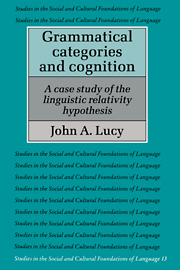Introduction
Published online by Cambridge University Press: 19 January 2010
Summary
The present study forms part of a two volume work that re-examines empirical research on the linguistic relativity hypothesis, that is, the hypothesis that differences among languages in the grammatical structuring of meaning influence habitual thought.
The companion work, Language diversity and thought: a reformulation of the linguistic relativity hypothesis, presents an analytic review of the historical development of the linguistic relativity hypothesis and various past attempts to provide empirical evidence directly relevant to it. The review is concerned with methodology in the broad sense, that is, with identifying the general requirements of adequate empirical work on this problem. The review analyzes in detail the flaws and the achievements of existing studies with the aim of formulating an improved approach to such empirical research. The present work provides a concrete case study which utilizes this improved approach.
General goals
The global aim of the project described in the present volume is to demonstrate how the linguistic relativity hypothesis as traditionally conceived can be investigated empirically. Taking Whorf's formulation and subsequent empirical research as the point of departure, four components of adequate empirical research on the linguistic relativity hypothesis were described in the concluding chapter of Language diversity and thought. The discussion also indicated which approaches were most likely to lead to significant progress at the present time. These components and the proposed approaches to them can be distilled as follows.
First, such research must be comparative, that is, it must present contrastive data on two or more language communities.
- Type
- Chapter
- Information
- Grammatical Categories and CognitionA Case Study of the Linguistic Relativity Hypothesis, pp. 1 - 6Publisher: Cambridge University PressPrint publication year: 1992



